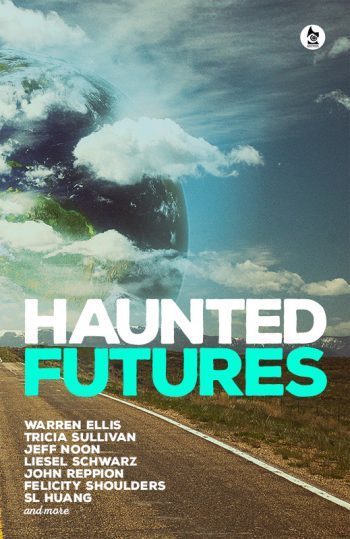Chuck Wendig is a successful author with lots of experience. When he writes about the, err, writing business, you should listen. Or read, as it were. There’s just too much to quote on this one so I’ll just point you to the blog post, if you’re a fellow wordsmith. If you’re not, well, have a nice day, I guess?
Month: May 2017
-
-
Dropping the tech giants

No, I’m not doing that. I stopped using Google once, but they ensnared me again. I’m weak, I know. Anyway, this semi-interactive column at the New York Times has been making the rounds, and I find it interesting. It asks the question which of the tech giants you’d stop using first.
Apple, Amazon, Facebook, Microsoft and Alphabet, the parent company of Google, are not just the largest technology companies in the world. As I’ve argued repeatedly in my column, they are also becoming the most powerful companies of any kind, essentially inescapable for any consumer or business that wants to participate in the modern world. But which of the Frightful Five is most unavoidable?
I’d drop them in the following order.
First, Microsoft. There’s not much they make that I can’t live without, but gaming would be difficult since I have a pretty extensive Steam library and the SteamOS is far from ready for prime time. I’d shed a tear and move on though, that’s what the Switch is for after all.
Second, Facebook. It’s no secret I find this to be an abhorrent company with questionable motives. That said, I find myself struggling to drop Instagram, and a lot of communication is happening on Facebook itself, and through Messenger. Still, all of that is replaceable to me. Still not panicking.
Third, Alphabet, which is Google’s parent company. This one would mean I’d have to go back to Fastmail for email as well as cut all the other Google Apps services. But you know what? While that would be a pain, the alternatives are getting there. Outside of email, I think all of Google’s services can be replaced with equally useful tools. In fact, had I done my Fastmail experiment today I probably would’ve been happy without Google still. They do quality services, but the ever watchful eye is as frightening as Facebook’s. And DuckDuckGo is a proper search engine too.
Fourth, Amazon. Prime isn’t really a thing in Sweden so this one might hurt more for some of you. I’d miss Kindle, my Oasis is my primary reading device, but there are plenty of alternatives. I’d also miss Comixology, where I read graphic novels. Much like the column I’m viewing this as a consumer, so Amazon Web Services (and Microsoft’s Azure, for that matter) are still free to use through the companies that rely on them. Quitting Amazon would hurt.
Finally, Apple. It’s not just that I’m invested in their ecosystem or that they make the best phones and tablets, no, it’s trust. Apple is the only one of the big five tech companies that appear to be fighting for me, and my privacy. Now if that would change things might be different, but hopefully they’ll continue to stand for the little guy.
-
Was WannaCry the NSA's fault?
Wired reporting on the Windows ransomware that’s wreaking havoc at the moment:
One reason WannaCry has proven so vicious? It seems to leverage a Windows vulnerability known as EternalBlue that allegedly originated with the NSA. The exploit was dumped into the wild last month in a trove of alleged NSA tools by the Shadow Brokers hacking group. Microsoft released a patch for the exploit, known as MS17-010, in March, but clearly many organizations haven’t caught up.
Even if this doesn’t originate from the NSA, it’s ample proof that no one should have backdoors.
-
Longreads is thriving
Longreads is thriving under Automattic. It’ll be interesting to see where this ends. They’re using a member funded model to pay for original stories, with a bonus attached:
Longreads has raised about $250,000 from “thousands of members” since it added memberships in 2012. The suggested monthly amount is now $5 a month or $50 a year, though readers can choose to donate any amount, and Armstrong said that the company’s gotten some thousand-dollar donations. All of that money now goes to pay authors, and WordPress.com matches every $1 from a reader with an additional $3, which clearly makes it a lot easier for Longreads to do what it wants to do.
-
SMS is not a secure protocol
O2-Telefonica in Germany has confirmed to Süddeutsche Zeitung that some of its customers have had their bank accounts drained using a two-stage attack that exploits SS7.
In other words, thieves exploited SS7 to intercept two-factor authentication codes sent to online banking customers, allowing them to empty their accounts. The thefts occurred over the past few months, according to multiple sources.
SMS (aka text message) is not a secure means of communication, and that isn’t anything new either. Keep that in mind when you send details, and use two-factor authentication that doesn’t rely on other means of verification too.
-
Fake ID, present and past
Fascinating story about fake IDs, present and past:
The fake ID racket wasn’t always so easy. In 1994, one of my 10th-grade classmates in boarding school purchased a fake ID kit from a graduating senior for $700. Even at 15, Phil had a remarkable entrepreneurial spirit and naturally gravitated toward the prospect of cornering the fake ID market at our New England prep school. “Once I got out of the red,” he remembers thinking, “I’d be minting money.”
-
The Nesticle story
Motherboard tells the story about the NES emulator Nesticle, an interesting read for those of us who used it back in the day:
NESticle, nonetheless, did something amazing: It allowed people to play old Nintendo games on cheap computers made by Packard Bell and other firms, and did so while introducing a number of fundamental new ways to appreciate those games. Divorced from Nintendo’s famously draconian licensing strategy, it introduced new ways of thinking about well-tread video games.
Would we have the retro-friendly gaming culture that we do today without its existence? Maybe, but it’s possible it might not be quite so vibrant.
-
Your digital journal, printed
Day One is my journaling app of choice. They’re branching out, offering printed journals if you want them. A brilliant move, but journals have a tendency to be kind of personal. Don’t worry, Day One’s got you covered:
The privacy of your printed journal is important to us, so we’ve created a printing process that is strictly confidential. All digital files are securely transferred to our printing facility. Printing is automated without any manual handling of the files. After printing is completed, your book is promptly packed, sealed, and shipped to your home. Any digital files used in the printing of your book are automatically deleted once this process is completed.
It’s up to you if you believe that. Either way, check out the sample journals, it looks pretty cool. I doubt it’ll fly though, but who knows?
-
Moore's Law's days are numbered
From a Moore’s Law obsessed piece on computer improvement:
As Moore’s law runs into the sand, then, the definition of “better” will change. Besides the avenues outlined above, many other possible paths look promising. Much effort is going into improving the energy efficiency of computers, for instance. This matters for several reasons: consumers want their smartphones to have longer battery life; the IoT will require computers to be deployed in places where mains power is not available; and the sheer amount of computing going on is already consuming something like 2% of the world’s electricity generation.
-
Princess Leia's Stolen Death Star Plans
This is my new favorite album: Princess Leia’s Stolen Death Star Plans.
This year marks two important pop-culture milestones: The 40th anniversary of Star Wars on May 25, and the 50th anniversary of The Beatles’ Sgt. Pepper’s Lonely Hearts Club Band a week later, June 1. Our new album merges both into one full-length concept album titled Princess Leia’s Stolen Death Star Plans. It’s the entire Beatles album as accurately as we could record it, only now it tells the story of Star Wars: A New Hope — in order.
First song embedded below, because obviously there’s a video version, but you should really pop over to Palette-Swap Ninja and read more about this. And download the album, it’s surprisingly well made.
-
Want your face scanned? Travel to Australia
Futurism posted this video regarding Australia replacing passports with facial recognition at airport starting this June:
https://www.youtube.com/watch?v=jNRJkNjSljA
Personally, I think this raises so many privacy issues that it’s scary. What will they do with all that data? Who’ll benefit from it, and when someone steals it (because that’s bound to happen), what will the data be used for then?
I think I’ll stay clear of Australia in the future.
-
Haunted Futures är släppt

Haunted Futures Haunted Futures är en antologi om framtiden där undertecknad råkar medverka, med berättelsen Futures Past. Mina medförfattare här är desto mer imponerande, så jag tycker absolut du ska köpa ett exemplar av Haunted Futures.
Baksidestext, typ:
You can’t see far, and the footing is uncertain at best. Ghosts and phantoms stalk the haze around you, and their chittering will lead you astray. There are no maps to this territory, but sometimes a brave soul strides out ahead into the haunted shadows. Those who return to the campfire of the now often bear tales of the visions seared into their minds while they were out there, in the mists.
We have scoured the earth for these most daring of travelers – the ones who have ventured out into the future and returned wraith-laden. Fifteen of them agreed to share their stories. Their enthralling accounts will seize you, and you might find it difficult to fight free of them afterwards, but any risks are overshadowed by the dazzling wonders that await. So muster your courage, and dive into the pages. Haunted Futures of all kinds await you, with open arms and suspiciously toothy smiles.
Några länkar, i all välmening:
- Köp Haunted Futures på Amazon, tryckt eller som ebok till Kindle.
- Köp Haunted Futures från Adlibris, tryckt enbart.
- Läs mer om Haunted Futures hos förlaget.
- Besök min boksida på TDH.me.
-
Haunted Futures is available now

Haunted Futures, cover by Gábor Csigas Today was the book birthday of Haunted Futures, an anthology about the future where I happen to have a story called “Futures Past”. There are several other writers in there, all more worthy than yours truly, so you should really check this one out.
Just check out that awesome cover by Gábor Csigas. It’s just so darn great. There was a livestream hosted by editor Salomé Jones, and while I couldn’t be on it, I must say it was a mammoth undertaking. I have no idea where Salomé finds the strength to do these things but there you go. The video should appear here if it hasn’t already.
Haunted Futures is available on Amazon, both in paperback and as an ebook, as well as on other places. Go grab it, it’s pretty darn great.
-
Twitterrific lets you change your app icon
If you’re an avid Twitter and iOS user, chances are you’re using Tapbots’s Tweetbot. I used to do that, but something about it didn’t really connect with me. Twitterrific on the other hand, did. It’s not without its quirks but I prefer it to other options.
The latest update lets you change your app icon, a feature I haven’t seen before. It’s pretty cool, don’t you think?

-
It’s not you, it’s all predetermined
Alan Moore being Alan Moore, in an interview regarding (but not limited to) the Spirits of Place anthology he’s got a story in:
Ideas are usually generated by the act of writing itself. William Burroughs spoke of ‘the word vine’; the process by which if you write down a word, this will shape and suggest the next word, and so on. Take this thinking to its counterintuitive conclusions, it suggests that writers, far from being the god-like creators of worlds that they may imagine themselves to be, are in fact only vehicles by which means ideas can have themselves. By the same token, if we are talking about the ideas embedded in a certain location – the complex aggregate of these ideas representing that location’s ‘spirit of place’, if you will – then I think we can reasonably and realistically speak of a place exerting its influence over someone who finds themselves writing about it.
It goes on, obviously. There’s also a glorious rant in there on kids today and how entertainment has stolen imagination from them.